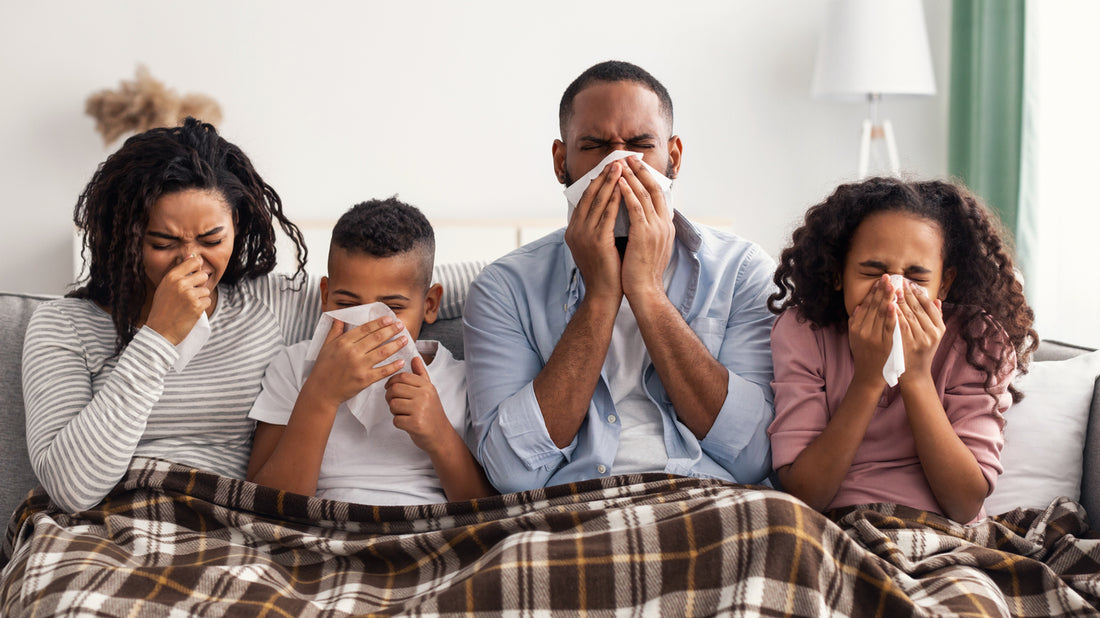Overview
A runny nose is the result of mucus dripping out of the nasal cavity. This sign could be caused by several conditions, including cold temperatures, the flu, and allergies. Doctors refer to a runny nose as rhinorrhea, which is a common sign in the fields of pediatrics and ENT.
The irritation of the nasal lining and sinuses stimulates the overproduction of mucus, which eventually turns into a hub for bacteria and viruses. To get rid of these microbes, the nose flushes them out, leading to a runny nose.
In this article, we will list the top causes of runny nose, then cover a few tips to stop a runny nose fast.
What causes a runny nose?
Allergies
Allergies cause an array of symptoms, including sneezing, sore throat, headaches, and a runny nose. When your immune system reacts to the allergen, it launches an inflammatory response in the nose, precipitating the overproduction of mucus.
You may need some tests to identify the allergen that’s causing your symptoms.
Common cold
This one is a classic. The common cold also irritates the lining of the nose, producing too much mucus. Aside from a runny nose, the common cold could also lead to nasal congestion.
Sinusitis
Sinusitis refers to the inflammation of the sinus cavities after a common cold or another infection. The inflammation within these cavities triggers epithelial cells to produce more mucus, leading to a runny nose.
Flu
The flu is another classic cause of a runny nose. Sometimes, it can be difficult to differentiate between the flu and the common cold.
Click on this link to learn more about these two conditions (insert).
Medication
Researchers were able to pinpoint a few commonly prescribed medications that cause a runny nose. One popular example is the family of antidepressants.
Dry air
Dry air affects the skin and mucosa. Low humidity will dry out the nasal passage, which eventually irritates the lining of your nose. Once again, an inflammatory response sets in and a runny nose follows.
Nasal polyps
Nasal polyps are benign growths within the nose that develop due to an inflamed membrane. Your doctor will address nasal polyps by removing them surgically or with the help of a special device.
Respiratory syncytial virus
This virus is one of the leading causes of the flu worldwide. It first starts by causing nasal and throat symptoms and then proceeds to the upper airways and lungs.
Learn more about the respiratory syncytial virus by clicking on this link (insert).
How to stop a runny nose at home (quick solutions)
Avoid dehydration by drinking plenty of fluids
The only serious complication of a runny nose is dehydration. Therefore, you need to drink plenty of fluids to keep your water and electrolytes balanced.
Drinking fluids will also help your nose get rid of the microbes more efficiently. Without enough water in your system, the discharges will be thick and sticky, further worsening nasal congestion.
Stay away from dehydrating beverages, such as alcohol and coffee.
Drink hot beverages (decaffeinated)
Hot beverages release heat and steam, which are essential to decongest the nasal cavities. To increase the effectiveness of these beverages, opt for the ones that contain mild decongestants. Examples include chamomile, mint, nettle, and ginger.
Use a humidifier
A recent study noted that inhaling warm steam is extremely effective at decongesting the nose and breaking down mucus buildup. Another study found that humidifiers can help people with the common cold. In fact, this device shortens the duration of recovery by 1 week.
Humidifiers work by vaporizing water, which moistens ambient air. Breathing in moisture dislodges mucus and dampens inflammation of the sinuses.
We recommend that you clean the humidifier regularly to avoid the buildup of microorganisms (e.g., bacteria, mold). Make sure to follow the instructions of the manufacturer.
Take a hot shower
A hot shower works similarly to humidifiers. Being under hot water will release moisture into the air, which gets absorbed by your nose and sinuses. This is the quickest way to relieve yourself from a congested nose.
To increase the effectiveness of this method, be sure to place your face in the direction of steam.
Use a nasal spray
A nasal spray is an over-the-counter treatment that treats nasal conditions. There are numerous choices of medicated nasal sprays. Alternatively, you could get a saline nasal spray.
Using a nasal spray helps with decongesting the nose and flushing out the excess mucus. According to a study, a saline nasal spray can help patients with a runny nose, nasal congestion, and sleep disorders.
Apply a warm compress
Placing a warm compress on your nose and forehead soothes inflammation and the pressure inside your sinuses. These compresses improve blood flow to the sinus area, which aids in flushing out microbes and proinflammatory metabolites.
The good news is that you don’t have to buy these. You just need to soak a clean cloth in hot tap water and apply it on your nose. Do this multiple times a day for 15 minutes.
Consider taking capsaicin
This chemical is what gives pepper its spicy flavor. We can use it to treat psoriasis, nerve pain, and many other conditions. Applying capsaicin to your nose will treat a runny nose, especially when the latter is the result of nasal congestion.
In fact, a number of studies concluded that capsaicin is superior to over-the-counter medications in the treatment of a runny nose.
Takeaway message
A runny nose is one of the most annoying symptoms of nasal irritation and inflammation. Applying the tips we listed above will help you stop a runny nose fast. However, if your symptoms persist for several weeks despite therapeutic measures, you may need to see your primary care physician for tailored medical advice.
We hope that this article managed to highlight the main causes of a runny nose and the effective measures to deal with this symptom.
Find this helpful?...Please Like, Share and Follow @greatermood also check out our other health topics here

